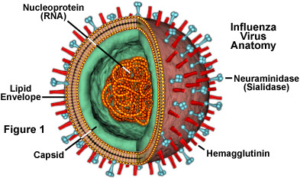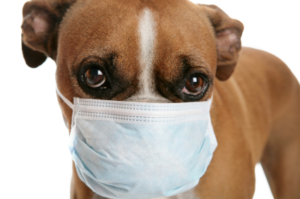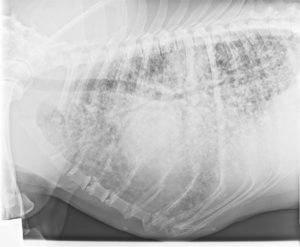We’ve all heard of “kennel cough” but what exactly is this mysterious cause of coughing?
In most cases “kennel cough” is a blanket term for an infectious upper respiratory tract infection. In reality, upper respiratory tract infections can be caused by a variety of viruses or bacteria, and often are a combination of pathogens. We call this “Canine Infectious Respiratory Disease” or “Canine Infectious Tracheobronchitis”. Here are some of the trouble makers!
- Bordetella bronchiseptica: Better known as Bordetella, this is the “typical” kennel cough culprit, and the most common. It is a bacteria, passed through the air. This is the bacteria we are targeting with the bordetella vaccine. The typical symptom is a deep, hacking cough with tracheal sensitivity. Less commonly ocular and nasal discharge and lethargy are seen. An
 electron microscope view of the Bordetella bronchiseptica organism is seen in this image.
electron microscope view of the Bordetella bronchiseptica organism is seen in this image. - Parainfluenza virus: this pesky virus is often found with the bordetella bacteria in upper respiratory tract infections. It can pave the way for bordetella to invade upper respiratory tract tissue and cause coughing. Signs are generally mild. This vaccine is included in some intranasal bordetella vaccines.
- Adenovirus: Until recently, adenovirus was under appreciated as a member of the common upper respiratory tract infection causing agents in dogs. With all the research surrounding influenza virus, we have started to appreciate just how prevalent this virus is! Signs are generally a mild cough.
Without diagnostic testing, we rarely know exactly which agent or combination of agents is the cause of the cough. Infection is usually treated with antibiotics and supportive care. In some cases, secondary pneumonia can be a complicating factor.
A more alarming cause of upper respiratory tract infection is Canine Influenza (CIV). There are two strains:
- H3N8– this was the first influenza strain to cross to dogs. It is believed to have jumped from horses to the racing greyhounds they were closely associated with.

- H3N2– this newer strain of influenza caused quite a wave of infections in central Illinois in 2016, and continues to cause outbreaks in the Chicagoland area.
Influenza causes signs of upper respiratory tract infection. It generally has a high morbidity (highly contagious). Fever, lethargy, and mucoid ocular and nasal discharge are more common with influenza than other upper respiratory tract infections. The outbreaks are more severe as dogs have no natural immunity to the virus. Veterinarians around the country have made CIV a part of their vaccine protocol. Ever wonder where the “H” and the “N” come from? Influenza viruses are named for the Neuraminidase and Hemagglutin proteins expressed on the virus surface. The expression of these proteins allows the virus strains to be distinguished. The image above is a drawing of an influenza virus.
Although we can’t protect dogs from all upper respiratory tract infections, vaccinating against bordetella/parainfluenza, and against canine influenza can lessen the severity of clinical signs for some of the most common pathogens. Vaccination is recommended for all dogs who are in close contact with other dogs through boarding, grooming, day care, or dog classes.
Coughing is NEVER something to brush under the rug. More sinister causes of coughing in dogs can include pneumonia, heart disease, cancer, and severe fungal infections. The image on the right shows lungs affected by Blastomycosis, a fungal infection common in our area.
Even if you suspect your dog has a simple upper respiratory tract infection, a veterinarian should do a full physical exam, and appropriate treatment should be implemented. Ignoring a cough is never a good idea.










